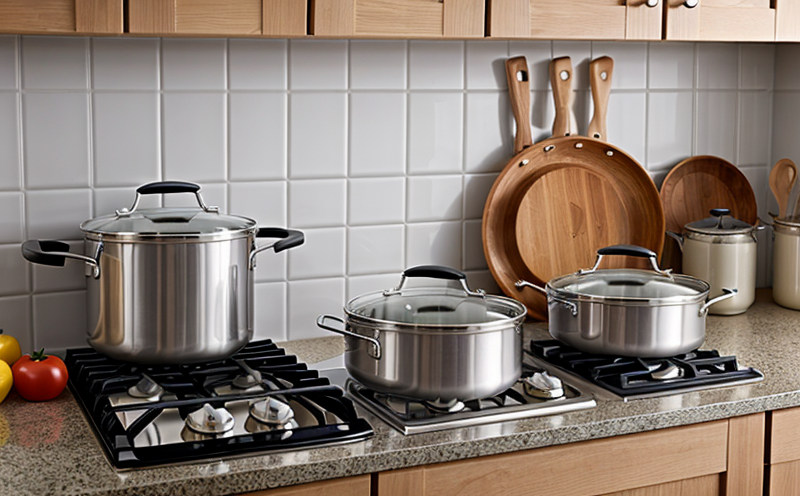Gloss and Appearance Testing of Kitchen Utensils
The quality of kitchenware is a critical factor in ensuring consumer satisfaction. Gloss and appearance testing are essential to evaluate the finish, shine, and aesthetic appeal of kitchen utensils. A well-polished surface enhances durability and provides an attractive product that meets market expectations. This service ensures that the gloss and appearance meet the highest industry standards.
In this testing process, we employ advanced instrumentation capable of capturing minute details of the surface texture and shine. The test parameters include but are not limited to: specular reflectance, roughness factor, color uniformity, and haze measurement. These tests help determine whether the product meets customer specifications and regulatory requirements.
For accurate results, we follow strict protocols for specimen preparation. This includes cleaning the utensils with appropriate solvents and water, drying them thoroughly to avoid any moisture affecting the test outcome. The specimens are then placed under controlled environmental conditions to ensure consistency in testing.
The equipment used in this testing can range from simple handheld testers to highly sophisticated spectrophotometers that provide precise measurements of gloss values. These instruments adhere to international standards such as ASTM E430, ISO 2813, and EN 20799. Compliance with these standards ensures reliability and consistency across different batches and production runs.
Our methodology also involves comparing the test results against industry benchmarks or customer-defined acceptance criteria. Any deviations are highlighted for corrective action to ensure that only products meeting the specified quality levels leave our facility. This rigorous approach helps manufacturers maintain a competitive edge in the market by delivering high-quality kitchenware.
Scope and Methodology
The scope of gloss and appearance testing covers various aspects of a kitchen utensil's surface quality. This includes not only the visual aspect but also how well the product resists wear and tear over time. The methodology involves several key steps to ensure comprehensive evaluation:
- Preparation of specimens: Cleaning, drying, and conditioning.
- Environmental control: Maintaining consistent temperature and humidity levels during testing.
- Instrumentation setup: Calibration and alignment of the measuring instruments.
- Data collection: Capturing detailed measurements using state-of-the-art equipment.
- Data analysis: Comparing results against predefined acceptance criteria.
The use of standardized equipment and adherence to international standards guarantees accurate and repeatable results. This ensures that the testing process is consistent across different batches and production runs, providing reliable data for quality control and product development teams.
Industry Applications
- Manufacturers of cutlery and utensils seeking to ensure their products meet consumer expectations in terms of visual appeal and durability.
- R&D departments looking to innovate new materials or designs that enhance the gloss and appearance of kitchenware.
- Quality control teams aiming to maintain consistent standards across all production batches.
- Suppliers providing raw materials for kitchen utensils, ensuring these materials meet the required specifications before they are used in manufacturing processes.
Eurolab Advantages
At Eurolab, we pride ourselves on offering comprehensive and reliable testing services. Our advantages include:
- State-of-the-art facilities equipped with the latest technology.
- Experienced technicians who understand the nuances of kitchenware testing.
- A commitment to adhering strictly to international standards.
- Fast turnaround times without compromising on quality.
- Confidentiality and data protection for all clients’ information.
We work closely with our clients from the initial consultation stage through to final report delivery, ensuring that their requirements are fully understood and met. Our expertise in this field allows us to provide valuable insights into improving product quality and enhancing customer satisfaction.





